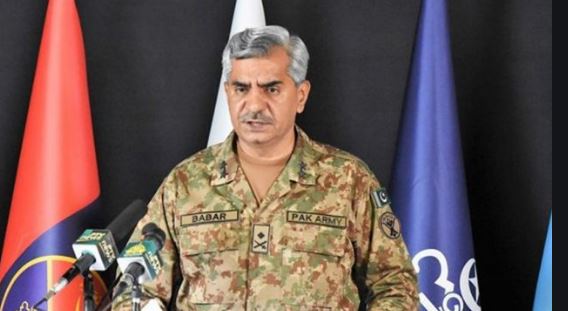Army to stay calm despite provocations

DG ISPR says Army never interfered in elections; PDM has no justification to come to Rawalpindi however it is welcome and shall be served with tea upon arrival; More than 83% of the Pak-Afghan border have been fenced
Naveed Miraj/DNA
RAWALPINDI: Inter-Service Public Relations (ISPR) Director General Major-General Babar Iftikhar has said army will stay on its course despite all provocations adding false narrative was being built against Pakistan Army that it ever interfered in the election process.
He said this during a press conference on Monday.
He further said PDM criticism against Pakistan Army was unwarranted adding it they come to Rawalpindi they will served with tea and refreshments.
The army’s spokesperson said the last 10 years were a challenging time in every aspect for Pakistan, but in 2020 alone the coronavirus pandemic and locust attack put the country’s food security and economy in severe danger.
Meanwhile, he said, banned organisations were being facilitated on the western border. Yet, despite all these challenges, the state, institutions, the armed forces and intelligence agencies and most importantly the Pakistani people faced these challenges with a united front.
He said that along with restoring peace in the tribal districts along the western border, socio-economic projects were also launched in this period. Maj Gen Iftikhar said concrete steps were taken to strengthen Pakistan’s borders with Afghanistan and Iran, adding that the security situation improved considerably as a result of successful operations against terrorism.
He said that whether it was India’s condemnable designs or the application of hybrid warfare against Pakistan; internal threats or external challenges, we “not only showed and identified [the threats] with facts, but also combatted them successfully. The world is recognising this [Pakistan’s position] as well, because the truth always prevails”.
DG ISPR said Operation Raddul Fasaad “consolidated the achievements of the entire decade” through “a whole of nation approach”.
He said through this operation, the terrorists’ support base, their facilitators, abettors, financiers and weapons were destroyed to a large extent.
“Today, there is no organised terrorist infrastructure comparable to the past left in Pakistan,” he said.Under Op Raddul Fasaad, authorities conducted more than 370,000 intelligence-based operations (IBOs) during the last three years, of which 50 were ‘major operations’. As a result of these operations, the authorities recovered 72,227 weapons and 5 million rounds of ammunition. In 2007-08, the state had control of only 37% of the erstwhile tribal districts. Today, all tribal districts have been completely consolidated into Khyber Pakhtunkhwa.
Major terrorist incidents had declined by 86% in 2020 since the peak in 2013, and were 45% lower compared to the preceding year. Maj Gen Iftikhar said law enforcement agencies had successfully neutralised half of all threats that arose in 2020. He also highlighted the significant improvement in Karachi’s security situation, stating that terrorism incidents had declined 95%, target killings by 98%, extortion by 99% and kidnappings by 98% since their peak.
Maj Gen Iftikhar said border terminals, scanners, posts and fencing had been utilised to cut down security threats. More than 83% of the Pak-Afghan border have been fenced, and more than 37% of the Pak-Iran border have been fenced.
These measures have led to improved revenue collection and reduced smuggling, as well as a marked reduction in terrorist and bombing incidents.
Maj Gen Iftikhar said there had been a marked increase in provocative incidents from the Indian side along the Line of Control, as well as an increase in targeting of civilian populations.”This includes innocent children, women and elderly,” he said. He highlighted the near exponential increase in ceasefire violations from the Indian side since 2014, which resulted in high levels of civilian casualties.
“We have retaliated with full force, and the Indian side has had to suffer heavy losses due to our response,” he said.
When they couldn’t succeed in this domain, India resorted to fifth-generation warfare, the general said.
A dossier of proofs related to India’s involvement in terrorism-related incidents in Pakistan was handed over to the international community, and ‘incontrovertible proof’ has been brought forth about India’s involvement in a disinformation campaign against Pakistan as a result of the EU DisInfo Lab’s investigation.
“Before we dissect India’s disinformation campaign, it is necessary to understand consider what Pakistan and India have been busy in over the last two decades,” Maj Gen Iftikhar said.
“Pakistan waged a successful war against terrorism in that period and demonstrated it is a responsible state. It conducted more than 1,200 kinetic operations targeting all types of terrorist organisations. More than 18,000 terrorists were eliminated.”
The general also highlighted a host of laws enacted to strengthen Pakistan’s anti-terrorism efforts, as well as the support extended to the international community as part of the global war against terorrism.
“More than 1,100 Al Qaeda terrorists were captured or killed; intelligence was shared with more than 70 countries, and Pakistan sacrificed 83,000 lives and $126 billion in economic losses in the process.”
“What was India doing at this time? India was escalating border incidents on its eastern front, enacting one of the worst lockdowns in occupied Jammu and Kashmir along with flagrant violations of human rights, and making an unsuccessful attempt against Pakistan in February 2019.”
Maj Gen Iftikhar listed more of India’s illicit activities in this period, including evidence of Indian banks’ involvement in terror financing and money laundering, Kulbhushan Jadhav’s assignment to Pakistan, the farmers’ protest in Indian Punjab, the noxious verdict in the Babri Mosque case, the EU DisInfo Lab’s report and the UNHRC’s damning findings of genocidal Indian activities in occupied Kashmir.
Related News

To cover up failure India’s new covert mily campaign
Sources indicate that the new operation involves fake encounters using illegally detained and forcibly disappearedRead More

Mohsin Naqvi visits home of martyr Major
RAWALPINDI, JUL 28: /DNA/ – Federal Interior Minister Mohsin Naqvi visited the residence of MajorRead More


Comments are Closed